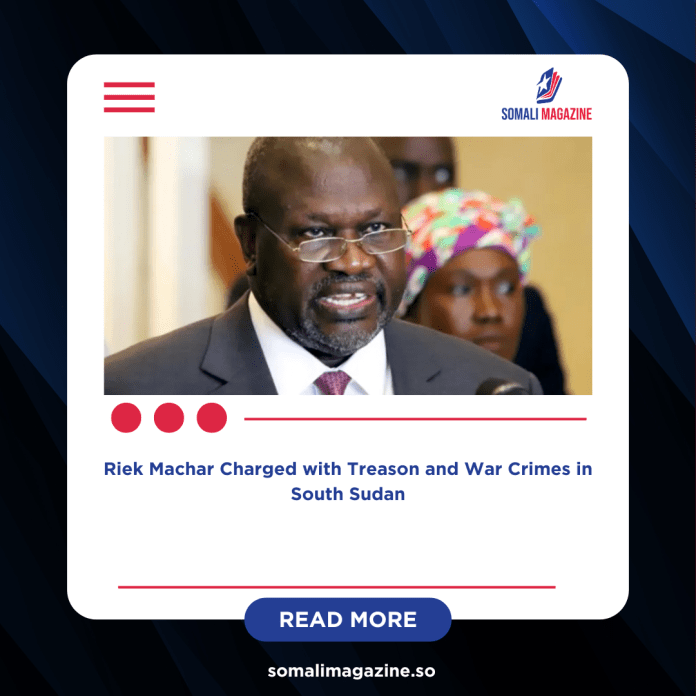Facebook Twitter (X) Instagram Somali Magazine - People's Magazine
South Sudan’s political tensions deepened this week after First Vice President Riek Machar was formally charged with serious crimes, including murder, treason, and crimes against humanity. The announcement came from Justice Minister Joseph Geng Akech on Thursday, who said the charges stem from a deadly attack in March allegedly carried out under Machar’s orders.
According to the government, a group known as the White Army — a loose collection of armed youth loyal to Machar — attacked a military base in Nasir, a town in northeastern South Sudan. Authorities claim that more than 250 government soldiers were killed during the assault. The justice minister described the attack as not only brutal but also a grave violation of international humanitarian law, citing desecration of corpses, persecution of civilians, and even assaults on aid workers.
Alongside Machar, seven other individuals were charged, including the former petroleum minister. Investigators say they were all part of a suspected rebellion plot aimed at destabilizing the government. These latest developments come against the backdrop of long-standing mistrust and rivalry between Machar and President Salva Kiir.
The animosity between the two leaders is not new. South Sudan, the world’s youngest nation, gained independence from Sudan in 2011 after decades of struggle. But only two years later, the country was plunged into civil war when Kiir dismissed Machar as vice president, accusing him of attempting a coup. What followed was a devastating conflict that lasted five years, killing an estimated 400,000 people through direct fighting, hunger, and disease. Millions more were forced to flee their homes, creating one of the worst humanitarian crises in Africa.
In 2018, the bitter rivals signed a peace deal that led to the formation of a unity government, with Kiir as president and Machar reinstated as his deputy. For a time, the agreement raised hopes that South Sudan could move toward stability, rebuild its institutions, and bring some relief to its war-weary citizens. However, tensions have persisted beneath the surface, with frequent flare-ups of violence in different parts of the country.
Those tensions escalated again earlier this year. Since late February, fighting has raged in the Upper Nile region, leading to hundreds of deaths and displacements. In response, Kiir’s government began cracking down on members of Machar’s party, detaining several of his allies, including the petroleum minister and the deputy army chief. The latest charges against Machar are seen as part of this wider campaign, though government officials insist the evidence justifies the prosecutions.
For many South Sudanese, these events raise fresh fears of a return to widespread conflict. Machar remains a highly influential figure with strong support among his Nuer ethnic group, while Kiir draws most of his backing from the Dinka community. The rivalry between the two leaders has often taken on ethnic dimensions, fueling cycles of revenge killings and mistrust. International observers worry that putting Machar on trial could shatter what little remains of the fragile peace agreement.
At the same time, the government insists it cannot ignore what it describes as grave crimes. Justice Minister Akech emphasized that the charges reflect not just a domestic matter but violations of international norms and agreements. The inclusion of crimes against humanity and violations of the Geneva Conventions suggests the government is positioning its case for broader legitimacy beyond South Sudan’s borders.
It remains unclear how Machar will respond. He has not yet commented publicly on the charges, and it is uncertain whether he will face trial or if negotiations will intervene, as has often happened in the past. For now, the charges mark one of the most dramatic escalations in the long-running power struggle between the two men at the heart of South Sudan’s politics.
As the nation watches these events unfold, the stakes could not be higher. For a country still reeling from years of bloodshed and displacement, the question is whether South Sudan will slide back into full-scale war or find a way to address its political crisis through dialogue.

